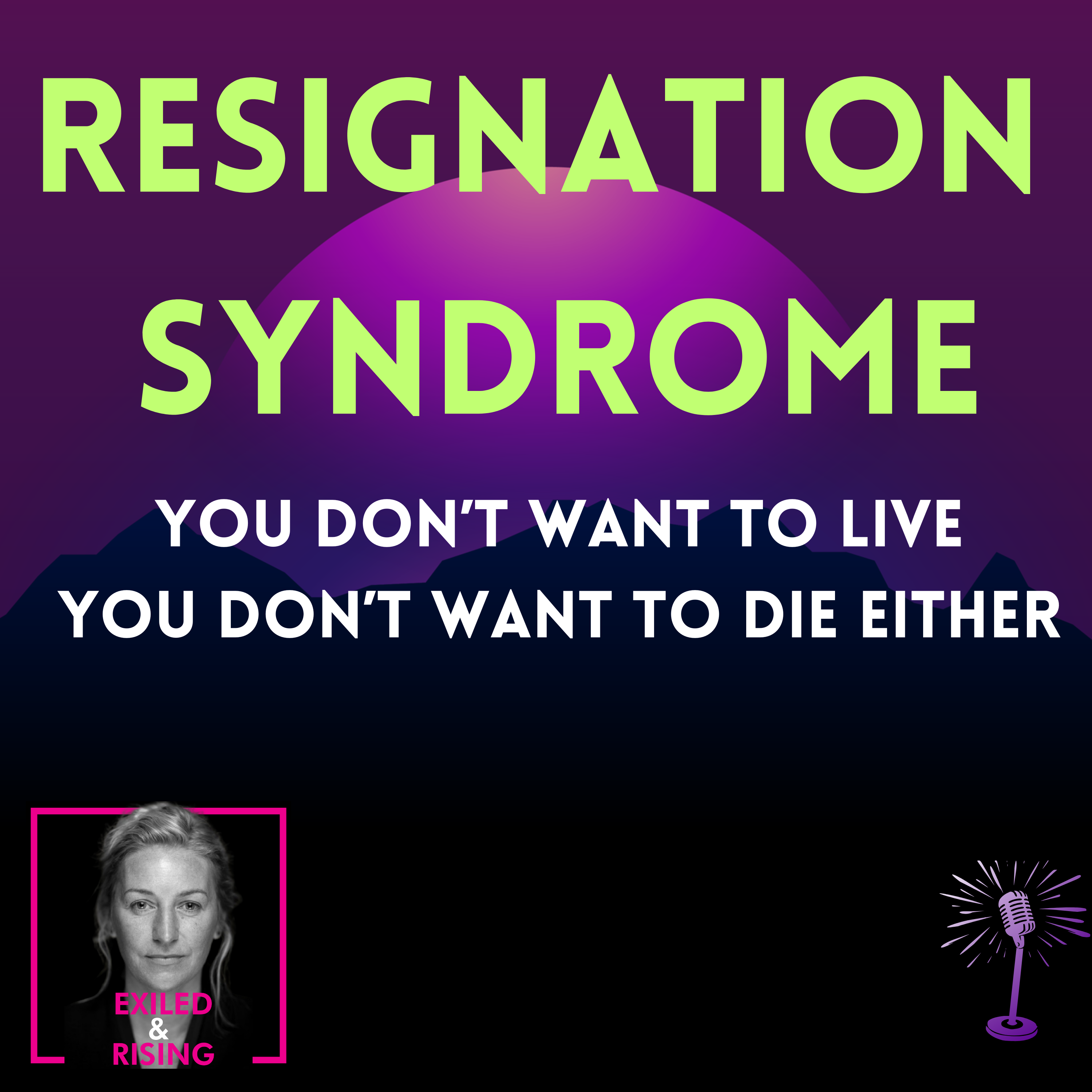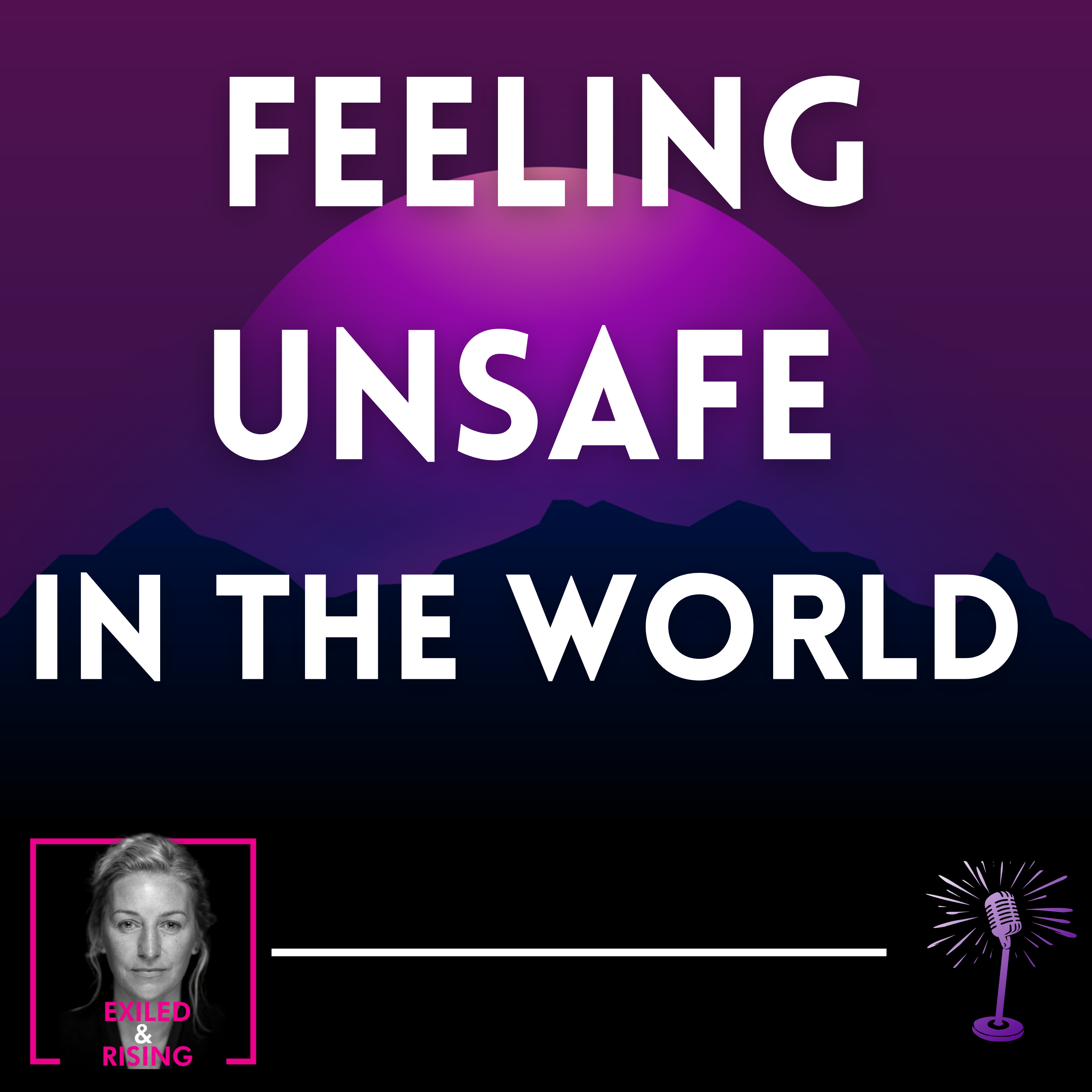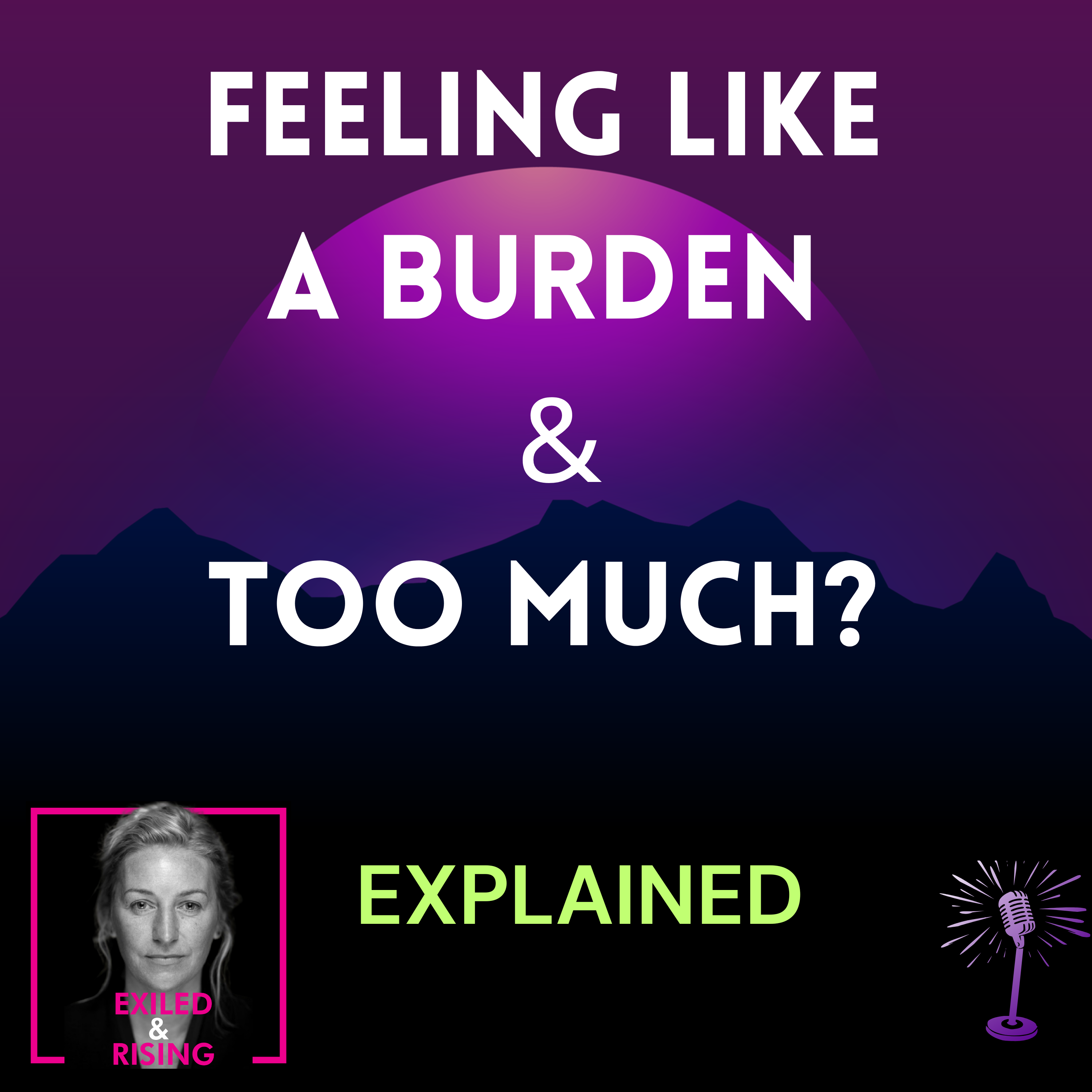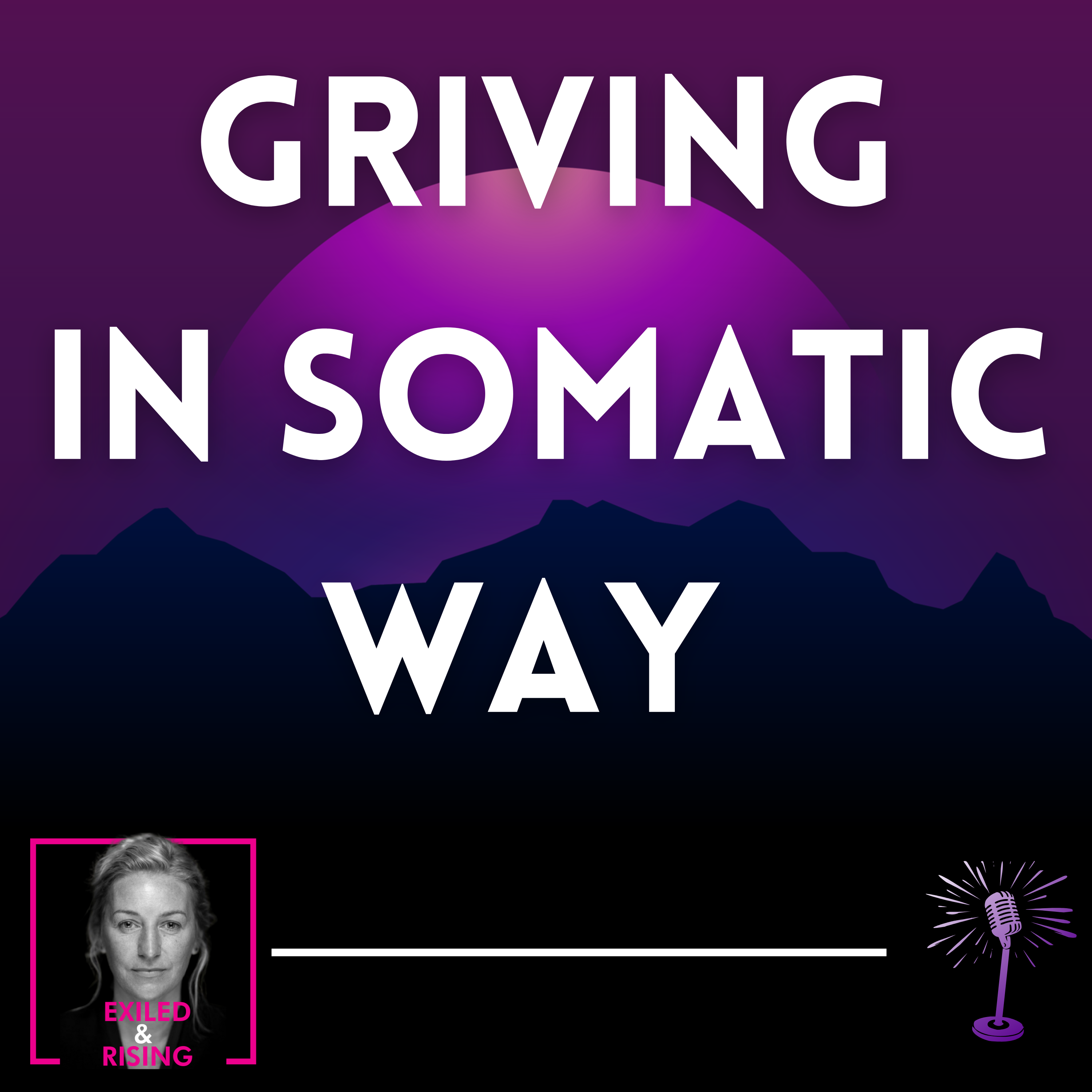Episode Transcript
[00:00:00] Welcome to Excellent Rising. I am Annamayl M. Somatic, experiencing therapist for PTSD and trauma recovery.
[00:00:07] Today we will cover resignation syndrome. The place where you don't want to live and you don't want to die. This episode is for everyone who survived war, every child, every adult who has ever felt the slow disappearance of life force inside their own body.
[00:00:30] This term resignation syndrome is coined by doctors in Sweden who are taking care of the kids coming from former Yugoslavia. And this is where I am from. And we often talk about trauma in terms of anxiety, fight or flight or depression. But there is a deeper, quieter form of survival that most people don't recognize, a state called resignation syndrome.
[00:01:01] Resignation is not burnout.
[00:01:05] It's not laziness, it's not depression, it's not lack of willpower, it's not being suicidal.
[00:01:17] It is biological shutdown that occurs when the nervous system, after prolonged trauma or uncertainty, decides that the safest thing to do is to shut down and to receive minimum input from the outside.
[00:01:44] And that's the place where you don't want to live, you don't want to die.
[00:01:52] You only want to disappear from outside life so you can have catonic rest.
[00:02:04] And it's a brilliant, the most brilliant, intelligent move of your nervous system, of your body.
[00:02:15] And know you don't need to go through the worst to feel this way.
[00:02:23] If you lived, and if you're living in continuous state of uncertainty from outside, your body will move into this state of resignation syndrome. So resignation syndrome is a nervous system collapse.
[00:02:45] And it is what happens when the body has spent too long in survival, fighting uncertainty that never ends and waiting for safety that never comes.
[00:03:03] And at first there is a fight or flight adrenaline, alertness, constant scanning, right?
[00:03:14] And then when escape isn't possible, when this is already too much, the body freezes.
[00:03:24] You will feel detached, spacey, not fully present.
[00:03:32] And finally, after too much for too long of this unsafety, the nervous system goes into shutdown.
[00:03:42] So from my experience after my third war, so we are talking about almost eight or nine years living in a, uh, war zone and surviving and having some gap in between of quote, unquote, of peace.
[00:04:03] Resignation syndrome hits you after everything seems as it's fine.
[00:04:12] So you can see many soldiers, you can see refugees.
[00:04:17] When the war is over, right, that adrenaline, uh, will move down and the system will go into resigning state because it just couldn't burn this energy anymore.
[00:04:38] Also, it doesn't have to be after the war. It can happen anytime. When the, uh, intensity from the outside is too much to handle.
[00:04:51] So this is called dorsal vagal dominance.
[00:04:56] It's a deep withdrawal. Their metabolism, emotion and energy all go offline.
[00:05:05] So there is a documentary about children from former Yugoslavia done in Sweden. You can find this movie on Netflix where you can see that catanic state where kids cannot eat, right? And it's not a choice, they will move into deep sleep state.
[00:05:30] For adults, what's very common, it's flatness.
[00:05:37] They cannot feel, they cannot plan, they just want to uh, shut outside world.
[00:05:47] And that's your body's the most brilliant self preservation response.
[00:05:58] Let me repeat this because there is so much shame, so much shame. And yet the doctors are still saying you are suicidal or you are depressed. And please, this is only for educational purposes.
[00:06:16] You need to talk with your doctor.
[00:06:19] But many doctors and therapists, they don't know about resignation syndrome. They don't.
[00:06:29] So resignation is not apathy, it's body saying, I will wait and use the least amount of energy what is left in me to react, to, feel, sometimes to eat, to move until the world becomes safe again for you. As I said, resignation syndrome was first identified among refugee kids coming from former Yugoslavia and, and other kids who were displaced by war, genocide, statelessness.
[00:07:13] And those kids, they were not mentally ill physiologically. They were protecting themselves from unbearable uncertainty.
[00:07:24] So when they are trapped in asylum, limbo, right, being stateless, they literally lost speech, appetite and movement.
[00:07:39] And they would enter in this cathonic state that mirrored the moral paralysis of the world around them.
[00:07:52] And this condition doesn't only exist in refugee camps. It lives in adults who have lived too long in survival environments, homes with chronic violence or control and neglect.
[00:08:11] So that can happen in your family of origin cultures, where emotional truth is forbidden, where uh, you couldn't be who you are in your own identity, sexual orientation, abilities or disabilities or jobs and economy, where there is constantly threat of your security, of your livelihood, and also, uh, in the families and system.
[00:08:53] This is important. So do not think this is happening only for people who went through the war.
[00:08:59] It can happen in a family that refuse to witness harm.
[00:09:08] Resignation can happen in anyone whose nervous system has learned that effort never leads to safety.
[00:09:21] And it just gives up.
[00:09:24] It just gives up.
[00:09:28] And many adults, uh, live in resignation while appearing functional.
[00:09:34] I was able to go to school, I was able to walk, quote, unquote, socialize.
[00:09:44] But inside it's deep, emotionless, flat, absent state. There is no effort anymore.
[00:09:57] So you might feel, you may recognize yourself if you feel permanently tired, even after rest, joy is absolutely out of reach.
[00:10:13] You can't Cry even when you want to, and you're not suicidal, and yet you can find reason to live.
[00:10:24] So that's a place the most easiest way to describe this is I don't want to live and I don't want to die.
[00:10:36] And you feel detached from your body, your voice, your relationships.
[00:10:42] And it's not depression in traditional sense.
[00:10:46] Depression can carry emotions, sadness, guilt, anger.
[00:10:52] Resignation carries nothingness.
[00:10:57] Nothingness, it's complete absence of charge.
[00:11:05] And body has reduced that charge energy so deeply that even emotion feels too expensive to spend the energy on it. It's absolutely brilliant way of doing it.
[00:11:26] And we know this is why talk therapy or of positive thinking, rarely they don't help in this state, because the thinking brain, right, isn't the problem, it's the nervous system.
[00:11:42] It's a nervous system.
[00:11:44] So if you're looking at the science, what's the science of shutdown?
[00:11:50] How this process unfolds inside body is we have a hyperarousal, right, fight or flight, where the system is on a high alert, panic, overworking, constant vigilance, right?
[00:12:06] And then we have a freeze response where the body begins to disconnect. You may feel distant or dissociated.
[00:12:15] Third one is collapse resignation syndrome.
[00:12:21] The body conserves every bit of energy by shutting down either metabolism, emotion and motivation.
[00:12:32] And you can appear calm, but this people can say, oh, you're very calm.
[00:12:40] But that's not grounded stillness.
[00:12:45] This is a stillness of depletion, not peace.
[00:12:50] And this state can last weeks, months, even years.
[00:12:56] Especially if safety and recognition never arrive.
[00:13:01] And because this is biological, this is not moral. So please, if you see someone in resignation state, you cannot inspire, you cannot discipline someone out of it or shame someone out of it.
[00:13:22] And if you are in resignation state, no shame, uh, no shame. Don't weaponize yourself, don't weaponize yourself, don't guilt yourself.
[00:13:40] There is a reason why your body is in this state.
[00:13:44] It's to protect you from what's unsafe from outside.
[00:13:51] And that unsafety could last for months and years. And this has nothing to do with you. Because when body collapse, it is because the world, the family, the system failed to hold you.
[00:14:15] Every resigned child, every numb adult is a living evidence of collective moral injury.
[00:14:27] And now I'm saying this from personal and professional place, but from personal.
[00:14:37] I lived in a war from age of 14 till 22.
[00:14:45] How the system failed.
[00:14:49] All kids, all teenagers, all young adults, and every human collectively failed us to protect us.
[00:15:08] That wasn't my fault, right?
[00:15:15] It's not my neighbor fault, my other friend's fault.
[00:15:22] It's collective moral injury, the events through. And this is why I say resignation syndrome is not only clinical, it's ethical, it's political and it exposes your families, governments and societies failed us, right?
[00:15:51] Especially society who are valuing more productivity over protection, conquering land over safety, or praising resilience and strength over justice.
[00:16:12] There is no accountability.
[00:16:15] And when accountability disappears, the nervous system stops expecting safety.
[00:16:24] And without safety, the only way to preserve your life is to use the minimum amount of energy and debts to resign until life becomes consistent and safe again.
[00:16:45] So also how we move more quickly to the place of feeling more safe. We start with body, right? We need to feel the right to rest, the right to process in quietitude, in solitary, in solitude, inside of our body. That permission to rest while you're in a state of resignation, don't be threatened by it, absolutely not.
[00:17:31] It's a deep need to rest.
[00:17:36] And how do we do this? On, um, SOMA level?
[00:17:40] I'm teaching the still somatic experiencing lesson.
[00:17:46] It's one hour just allowing to rest, allowing to rest so body can find inside that safety and certainty first.
[00:18:06] So with this somatic lesson, you can always go to the practice and repeat this every day, every day that your body will allow to be in this safe space of rest.
[00:18:27] Please check the links below.
[00:18:30] Because healing from resignation is not about pushing through and it's about re educating, relearning the body to trust life again.
[00:18:45] And we do this through small consistent cues of safety, what I call micro safety practices. We are cultivating micro safety and reconnecting with relational safety.
[00:19:04] Right?
[00:19:06] And then reawakening through movement and breath.
[00:19:12] And those micro movements are cues to your nervous system, cues that you're not in danger anymore. And healing from resignation is slow, it's septal and it's sacred.
[00:19:30] And it's not about motivation, it's about permission to exist, to feel what you feel, to be safe in your own skin again.
[00:19:49] So please check the lesson below in the show links.
[00:19:53] It's called resignation syndrome recovery.
[00:19:57] It's very distilled. One hour where we're implementing and going through those steps so the body can move into regulated state where you would feel safety. And also if you're a therapist, if you're a parent, if you're a caregiver, uh, know that first step is not to activate, but it's to stabilize.
[00:20:25] And don't demand engagement.
[00:20:28] What you need to provide is safety. It's predictability, it's warmth, it's routine.
[00:20:38] Your presence needs to be medicine.
[00:20:44] Right.
[00:20:46] So Resignation syndrome is the best body's way of saying, I, uh, will not waste energy on a world that refuses to care.
[00:20:58] So it's not a mental weakness, it's biological protest and protection.
[00:21:07] And for everyone who is living in this state, adults who are quietly functioning through this emotional emptiness, know this. Your body is brilliant. There is a reason why you're in this state.
[00:21:25] It has kept you alive the only way it could.
[00:21:31] And now the work is to gently show you that life can be safe again, that safety can be learned, that trust is not naive. It's in our, uh, inner selves.
[00:21:51] And you don't need to fight for your aliveness.
[00:21:56] Absolutely not.
[00:21:58] So let me summarize all of this.
[00:22:02] Resignation syndrome.
[00:22:06] When trauma is unresolved and the nervous system does not feel safe enough to re engage with life outside, Resignation syndrome can persist for weeks, months or even years.
[00:22:25] And key factors that keep the body in this state ongoing uncertainty, not knowing what comes next, or lacking control over your environment keeps the nervous system in this state and globally. What you're seeing now, the level of uncertainty, most likely we will see people going into this state more m and more right.
[00:22:58] Lack of social support, feeling unseen, unheard and disconnected reinforces the nervous system belief that the only way to survive is to stay withdrawn.
[00:23:15] That's why it's so important.
[00:23:18] Communities, support groups, right? This is what we do in Somatic Trauma Recovery Center.
[00:23:27] Please check the links below. It's so important.
[00:23:32] Also, what keeps the system in a deep, uh, shutdown in a Resignation syndrome is silencing or self minimization.
[00:23:46] So if someone is told that their experience wasn't that bad, or they compare their pain to others, it prevents the trauma from being processed and reinforce the shadown, um, response.
[00:24:03] That goes for you if you are labeled as strong one and resilient one by the family, friends in society. Please check my episodes about burden of being called strong one and resilient.
[00:24:28] What I witnessed throughout my practice is people who are labeled as strong one, they will go from this hyper vigilant state into resignation syndrome. Very common, then we have unprocessed, um, grief.
[00:24:46] If loss change, immigrating, exiling, being displaced, changing your jobs, moving from one city to another, or if your identity shifts, your belonging, and if that's never fully, um, acknowledged, the body holds onto the pain, keeping you right in this trapped numbness.
[00:25:19] And the last one, why we move into Resignation syndrome is too much, too sudden, when impact of experience is traumatic and too shocking for your nervous system to absorb.
[00:25:39] So please remember there is no forcing motivation, not pushing through or trying to snap out of it.
[00:25:47] Right?
[00:25:50] It's ah, a deep sacred space your nervous system is trying to do.
[00:25:56] And you want to honor that.
[00:25:59] And then gently guiding back that intelligent biology you have into safety, into engagement, into connection.
[00:26:17] There is nothing wrong with you, your biology is keeping you safe.
[00:26:27] And we need to remind biology that it's safe to be between you and you in your body.
[00:26:40] And cultivating this micro safety, reconnecting with relational safety and bringing the somatic awareness you will move into reawakening your system into the safety. So your body is not betraying you, it is protecting you the best way it knows how.
[00:27:08] And the work is to honor this protection while gently guiding yourself back to connection and vitality.
[00:27:19] How do we do this?
[00:27:22] One lesson I'm guiding.
[00:27:25] Please check the links in the show notes and sign up.
[00:27:32] And as we close today, please remind yourself to be gentle with yourself.
[00:27:42] Be gentle with people around you.
[00:27:47] No judgment, no shame, no guilting.
[00:27:53] But honoring your biology, your system, your trust and faith into intelligence of your body.
[00:28:10] This is all for today.
[00:28:13] I am Anna Mael. This is exhaled and rising.
[00:28:18] Until next time.
[00:28:20] Much care.
[00:28:22] Much care.



